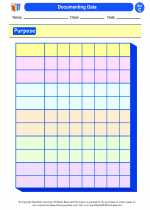What is Fiberglass?
Fiberglass is a composite material made of fine glass fibers woven into a fabric or mat, which is then reinforced with a plastic or resin. It is known for its strength, durability, and resistance to heat and corrosion.
Composition of Fiberglass
Fiberglass is composed of glass fibers and a binding material, typically a plastic or resin. The glass fibers provide strength and rigidity, while the binding material holds the fibers together and provides additional structural support.
Properties of Fiberglass
- Strength: Fiberglass is known for its high strength-to-weight ratio, making it a popular choice for applications requiring structural integrity.
- Durability: It is highly resistant to corrosion, making it suitable for outdoor and marine applications.
- Insulation: Fiberglass is a good insulator of heat and electricity.
- Lightweight: Despite its strength, fiberglass is relatively lightweight, making it easier to handle and transport.
Uses of Fiberglass
Fiberglass is used in a wide range of products and industries, including:
- Boats and marine equipment
- Automobile components
- Aircraft parts
- Building and construction materials, such as insulation, roofing, and panels
- Sports equipment, such as fishing rods and hockey sticks
- Water and wastewater treatment systems
Studying Fiberglass
When studying fiberglass, it is important to understand its composition, properties, and practical applications. Consider the following study guide:
- Describe the composition of fiberglass and explain how the combination of glass fibers and binding material contributes to its strength and durability.
- Discuss the properties of fiberglass, including its strength, durability, insulation, and lightweight nature.
- Explore the various uses of fiberglass in different industries and products, and explain why it is chosen for these applications.
- Conduct experiments or research to demonstrate the unique properties of fiberglass, such as its resistance to heat, corrosion, and electrical conductivity.
- Compare fiberglass with other materials, such as steel or aluminum, and analyze the advantages and disadvantages of using fiberglass in specific scenarios.
By understanding the composition, properties, and uses of fiberglass, you can gain a comprehensive understanding of this versatile and widely used composite material.
.◂Science Worksheets and Study Guides Third Grade. Science in our world - 3rd gr.
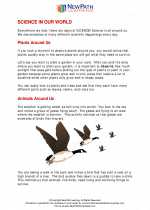
 Worksheet/Answer key
Worksheet/Answer key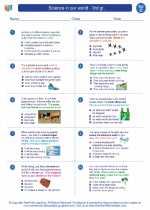
 Worksheet/Answer key
Worksheet/Answer key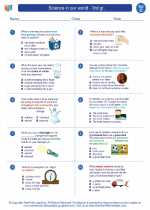
 Worksheet/Answer key
Worksheet/Answer key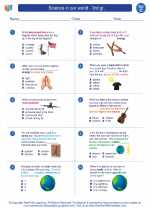
 Worksheet/Answer key
Worksheet/Answer key